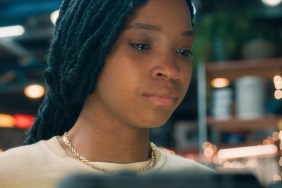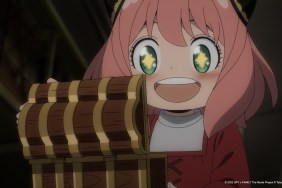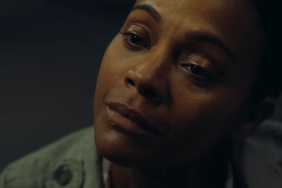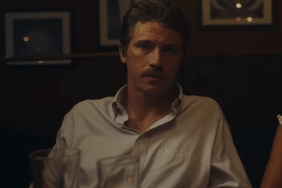Carlos Cuarón may have spent the past few years living in the shadow of his famous filmmaking brother Alfonso, but seeing his directorial debut Rudo y Cursi, there’s no denying the contribution he brought to the table when he co-wrote the Oscar-nominated script for his brother’s movie Y Tu Mamá También.
It doesn’t hurt that Carlos’ first feature film as a director reunites that film’s two stars, Gael Garcia Bernal and Diego Luna, as Tato and Beto, two overly-competitive brothers who achieve overnight success and fame playing on opposing Mexican soccer teams after being discovered by a greedy and manipulative talent scout known as “The Baton” (Argentina’s Guillermo Francella). Cuarón uses this setting to explore themes that must have been close to his heart, including the bond of brotherhood and how it’s tested by the Mexican soccer system, where young men can be working as plantation farmers one minute and reaching the heights of fame as sports stars the next. It’s a somewhat cynical look at the sport, but it’s another great exploration of ideas that could only be found within Cuarón’s unique perspective on Mexican society.
ComingSoon.net had a chance to get on the phone with Cuarón last week to talk about the movie that’s already taken Cuarón’s native country by storm, grossing more than many Hollywood blockbusters.
ComingSoon.net: I first heard about this movie from Alfonso maybe two or three years ago. So was this an idea that’s been bouncing around for a long time?
Carlos Cuarón: Well, yeah, somehow. I wanted to make my personal feature film like ten years ago; it was a totally different project and it collapsed. At the same time, the same happened to Alfonso with a personal project he had here in the States and that’s the reason why we made “Y Tu Mamá También.” Then, during the “Y Tu Mamá También” publicity tour, Diego, Gael, Alfonso and I would just throw out ideas of stories we wanted to make together and none of them happened until I told the original concept I had for “Rudy y Cursi” to these two guys and they wanted to make it.
CS: Were there stories actually based on real brothers playing in Mexico who ended up competing against each other or was that completely fictionalized?
Cuarón: No, it’s completely made-up. I guess there’s some of me and Alfonso and everyone else in the movie. I think that Rudo and Cursi and Alfonso and I share the silliness, and probably the fact that we tease each other all day long and we have a lot of fun together, but that’s nothing autobiographical. Brotherhood, it’s the same everywhere and we repeat patterns and things like that.
CS: From watching this movie, one might get the impression you have somewhat of a love/hate relationship with football, maybe everyone in Mexico does, but it seems you’ve included some good, some of the bad, but if often seems cynical. Were these feelings you’ve always wanted to express?
Cuarón: It’s not a love/hate relationship. Probably with Mexican football, I would have that, because I love football. The problem is that I don’t like the way it’s played in Mexico. No, I’m a soccer fan. That’s part of the reason I wanted to make this film; I wanted to do something that had a soccer context, but I don’t know if you’d call it a love/hate relationship.

CS: There are some thing that are very cynical like the character “Baton” who plays the brothers against each other and that’s a game to him and that it’s not just about money, but it’s about creating the rivalry.
Cuarón: It’s probably cynical but it’s the truth. That’s what happens with agents and managers in sports in general, in football in particular, and in Mexico specifically. They handle all these players and sometimes, they become a surrogate father, but at the end of the day, they only care about themselves. It’s just what happens usually, and to tell the story, I needed to have a character like that who you think probably is cynical. I see him as a seducer. I think it’s a character you end up loving, but he’s not very nice at the end.
CS: Even though the title is “Rudo y Cursi” and it’s about the brothers, the movie is almost as much as him because he’s the puppetmaster controlling everything that happens to them.
Cuarón: Yes, he tells the story also, so from beginning to end, it is in front of you and that is the reason why in the last shot he looks at the camera, he recognizes that himself that he’s leading the camera all along.
CS: He’s great in the film and I wondered if there was a lot of crossover between Latin and South American countries in terms of actors. He’s obviously a big star in Argentina, but you wouldn’t expect a lot of stuff from Argentina to get up to Mexico and vice versa. How did you find out about him?
Cuarón: I wanted the character to be Argentinian, because it represents the Mexican reality, and part of what I wanted to do was a social portrait of today’s Mexico. Two years before shooting, I was invited to Buenos Aires to give a talk, and I was with another actor in a cafeteria and this guy appeared and they said “hello” and I was introduced very briefly to Francella, but I didn’t know who it was. Then back in Mexico City, I saw his TV show briefly. I thought it was a cheesy broad comedy Argentinian TV show, so I just changed channels. Then a few months later, something really weird happened, which was that I dreamt of him doing “Batuta” as he appears in the film, so when it was the moment to make the casting in Argentina, I asked the local casting director to cast Francella. His reaction was “Let’s not do it because I don’t think he’s the right guy for your film. He has a different tone.” I told him we have nothing to lose and he should try it, and to our surprise, we found that this guy at age 50, he wanted to reinvent himself because he had been typecast all his life, so I decided because of his talent and the fact that I dreamt of him at some point when I didn’t even know who he was. I got to know who he really was when I hired him and I spent an afternoon with him in Buenos Aires. I could see people would get prohibited parking spots for him or I was driving in the car with him and he was trying to make a turn and he let this woman pass and she recognized him and stopped in front of the car, left her bags in the middle of the street, and said “Thank you, Guillermo.” I had to leave and go to the airport, so Guillermo stopped a cab for me and the cab driver couldn’t believe it. All the way to the airport was a monologue about Francella, and that’s when I got to know the kind of idol he actually is in Argentina. My decision had nothing to do with a market decision, because Argentina is a very small market. It was his talent and the weird fact that I dreamt of him.
CS: Are all those analogies and anecdotes about soccer that “The Baton” makes, were those all yours or were some of those known sayings or ideas among soccer fans?
Cuarón: I mean they’re all mine, because I wrote them, but they’re all Baton’s, because that’s his voice. But it’s actually an homage to the left wing soccer players or soccer coaches, they’re all Argentinian. One of them is César Menotti who was Argentina’s head coach in the World Cup in ’78, the other one is Jorge Valdano, who played in the Argentinian team in the World Cup of ’86. The other guy’s last name is Capa. They’re all friends, and they all have a more humane point of view on the game, so they believe in the joy of the game and not in the business that has created a monster, so to speak. It’s an homage to them and their philosophy. It’s pretty much that. I love human contradiction, so it’s a way of creating a more dimensional character with Baton, because he’s so poetic and philosophical, but his actions contradict that because he only cares about money.

CS: I wanted to talk about working with Gael and Diego again. “Y Tu Mamá También” really broke them in this country and they’ve been appearing in a lot of movies since then. Did you write this specifically to bring them back together?
Cuarón: The thing is that my original concept was I wanted to make a fake documentary about this soccer player from a humble background and he made it big, but when he was at the peak of his success, he disappeared. I told this idea to both Gael and Diego separately, and they both said they wanted to be that guy. It was great, but I had a problem because I had two actors and only one character. At that moment, I realized that what I wanted to do was work with both of them again, so I made up a brother and decided to make it a sibling rivalry story. I met with both of them again, together, and I told them about my new take on the project. They both loved it but their first reaction was Gael saying, “I cannot be Cursi, I have to be Rudo” and Diego was the opposite, he said, “Yeah, and I have to be Cursi.” I told them that I didn’t want to make “Y Tu Mamá También 2.” I wanted to make something different to create something original. For that, I need to start from scratch and I wanted to cast them against their natural type. They got it immediately and they started to throw out ideas and I started to write the script.
CS: With “Y Tu Mamá También,” I assume you and Alfonso wrote that and then cast them afterwards, but for this one, you knew both guys. Did you want to work with them on developing their characters before writing or did you want to use the same process you did before to write it?
Cuarón: I wanted to work with them on the characters and character construction. If they had some ideas, I would take them, and the bad ideas, I would say, “No, I don’t think that’s right.” And then many of their ideas were written into the script, but most of them, we worked together during rehearsals with the character construction. The specific part of the acting that’s not in the script, like body language and that kind of thing and things we discovered along the way, and that was a great way to collaborate.
CS: It must have been different because you were directing. I’m not sure how involved you were with the rehearsals of “Y Tu Mamá También” but in this case, you could be more involved after you finished writing the script.
Cuarón: The thing is that with “Y Tu Mamá También,” the characters were very close to Gael and Diego’s real life, so it was more a projection of that, and in this case, my biggest concern was that they were going to be representing very humble, naïve, even ignorant banana plantation peasants, and these guys are really sophisticated, cosmopolitan Mexico City guys, completely urban. Even while I was writing the script, I would tell them, “Start thinking how you’re going to nullify yourself to become these guys that have nothing to do with you guys.” Yeah, they were very aware of that, so each of them worked at it differently; they have their own way of doing that. Then we came up with different stuff, like I wanted the characters to have a local accent for where we shot. We made up that accent based on the accent people have in that region we shot, which is on the Pacific coast and those things were important to me, because it was a part of that social portrait. Accents say a lot about people; it’s not only the region where they live but what they do, and a class thing, and the social status (in which) they belong. Also, the thing is that in Mexican films, most of the time, they can happen anywhere in Mexico, which is (a big country) like the U.S. For some reason, they all talk generic “chilango” which is generic Mexico City slang. I just have never gotten that, because I’m from Mexico City and I’ve traveled all around my country. I feel that accents are like the music of the language, so I wanted to do something different, to go against the standard thing that is common in Mexico. We did it and we had a lot of fun together doing that, creating the rules of the accent that we shared with the other Mexico City actors that I brought to this place. I mixed that with the local accent from all those people that I used as actors.

CS: I wanted to ask you about working not only with your brother as a producer, but also his production partners. This is the first Cha Cha Cha production, and while you’ve obviously worked with your brother for many years, did each of the three guys add something different or was it just good having them involved so you could get things you might need to make the movie? What was the working relationship like?
Cuarón: What was great about the producers was that they gave me complete creative freedom. They were also very demanding at the same time, the way they are with their own films, but I didn’t really have a problem with that because I’m also that way and I’m also very self-critical. It was great to have their feedback or their comments on the script or the dailies or whatever, because these guys are three great directors. Their point of view was not like the typical producer notes or feedback, it was from guys who know their job and know their craft, so most of the time, they were brilliant notes and feedback. I didn’t obviously take all of them, because they gave me that freedom to decide what to do. What they really wanted was to fulfill my vision, but when they said they wanted to produce this film the way they would want to get produced. To give creative space to the director to make a movie and just that. Alfonso went to the set two days, Alejandro went one day and Guillermo was shooting “Hellboy II” so the contact with him during shooting was Emails and phone calls, because he was so busy. That’s the kind of relationship we had. Actually, they would have done the same thing if they hadn’t been my producers because that’s the way we relate to each other, the way we operate. They send me their scripts, I give them notes, and then we get into each other’s cutting room and try to help make a better movie. So “Rudo y Cursi” officialized that relationship with a movie, and Cha Cha Cha officialized that relationship with a production company.
CS: I’m familiar with the movies by all three guys and they tend to be very different. Did you end up getting three sets of very different notes for every draft of the script? It wouldn’t seem that the three of them could possibly all see things the same way.
Cuarón: They would give me notes. It depends, because when I pitched Alfonso the story a long time ago, he said, “Okay, I’d like to help you produce this film and set-up your script once it’s bullet-proof.” Once that happened, one day he called me and said, “What if I invite Guillermo and Alejandro to help me produce this with me and do this together?” and I said, “What if? Man, I’m honored, that’s a privilege.” Then he told me they were creating Cha Cha Cha. I didn’t know, because it was their thing. It was like a very organic thing to happen, or at least I felt that way because in the mid-’90s, I had dinner once with Guillermo and Alfonso. I was really depressed, and he asked me why and I told him that I was writing all these scripts that weren’t getting produced and it was like giving birth to dead babies. He said, “Just direct them, man” and that had never crossed my mind before because I just thought of myself as a writer. Alfonso was like, “Yeah, Guillermo is right” and three months later, Alejandro gave me my first directorial gig doing a documentary, but more like an infomercial, but it was my first thing as a director. When Alfonso suggested that, I just thought it was incredible because I have to thank these guys that I became a director. Yeah, it was just organic to me and yeah, we all have a different perspective on life. Even though Alfonso and I grew up together and we worked together on many projects, I mean, he doesn’t give a sh*t about soccer for example, and I’m a soccer freak. There are things I care about a lot and he doesn’t, and the other way around. All our films are different and that not only defines who we are, but we also help each other because we admire each other, and none of us are ashamed of that.
CS: Something like the movie’s big set piece at the stadium at the end, was that easier to get because of the connections to the three guys and how do you pull something like that off?
Cuarón: The thing is when I was writing the script, I was really concerned about soccer, because I didn’t want this movie to firstly be a soccer movie. One day I saw Michael Haneke’s “Funny Games” which is probably the most violent film I’ve ever seen and all the violence is off-camera, so after seeing that film, I said, “Hey, that’s what I have to do! Shoot soccer off-camera” so we get to know what happens in the game because of the human emotions of people reacting on the stands or the sportscasters narrating the game. I only go down on the pitch in the climactic moment in the rivalry between these two guys. Also, soccer is not a dramatic sport to shoot. A sport like baseball is, because to create drama, you need a pause, and baseball has a lot of pauses in between each pitch, there are things that change probabilities and that’s dramatic. The same happens with American football, but boxing is the most dramatic sport because it’s so physical. Soccer it never stops. You play, you play, you play, it never stops. The only moment you actually stop and pause is at the penalty kicks. Penalty kicks become a Western duel, and it’s very dramatic because it’s two guys facing each other and destiny and potential death, whether it’s literal or metaphorical, and that’s what I wanted to do. I did understate it, the first penalty kick, because I wanted to make clear that it’s all about the rivalry between these two guys, and then in the climactic scene in the film, I shot it like a Western as sort of a homage to all those Westerns I saw when I was a kid, especially “The Good, the Bad and the Ugly” and all the Sergio Leone Westerns.

CS: This movie has been a huge hit in Mexico, having made $9 million which isn’t much by American standards, but is huge compared to many Hollywood blockbusters that play down there. What do you hope that American audiences will be able to get out of it? Obviously, Americans know the two actors but might not be big fans of soccer. Do you think they’ll be able to understand some of the things about the sport?
Cuarón: Well, I think that the main thing is the universal thing that we can relate to is that we all have brothers or someone who is like a brother and we all know about those dynamics and how we poke at each other or teach each other or how you can have an argument and five minutes later, everything is forgiven. Or you have an argument and 25 years later, you run into your brother again that you haven’t seen for the last 25 years and you say “Forgive me.” Or you have an argument and 25 years later, you run into your brother and say, “F*ck you.” That’s all about brotherhood, so that’s what I think people relate to. Also, the specificity of the concept, which I think is the same as “Y Tu Mamá También.” The fact that the guys who know Mexico, well, they recognize the place and see that it’s a very honest social portrait of my country. If you don’t know the country, then you get to know the country I believe, and not precisely the tourist part of it but more like the social aspect of it. I think there are many things that audiences may like about this film, and also that it’s also very entertaining. Tonally, it has this very gentle, kind tone that you’re laughing and you think it could probably be a comedy, but at some point, you start to feel it’s creating this bittersweet endearing story.
CS: Very well said. Now I understand you’re doing another movie with Alfonso, too, where he’s directing one of your scripts? How’s that been going and is that something already underway?
Cuarón: I’m very slowly writing that because it’s not going to be his next project. It’s just something that we want to have a first draft and then in the future at one point, we can set it up. Right now, I’m in that process while Alfonso is trying to set up his next project.
CS: Do you have anything else you might want to direct? Another script maybe?
Cuarón: Yeah, I have several problems… problems, yeah, I have problems… no, I have several projects in different stages of development. Some of them are just ideas, some of them are fully-written scripts that I would have to rewrite. I haven’t had the time and the quiet to sit down and think about the next one I want but things are moving. Creative people, we never stop, so I’m restless. There’s no way we can stop, but at the same time, I’m too busy right now doing publicity. We released the film in Mexico in December so all this month, that’s all I did, going around the world promoting the film. In my free time, I try to write this project I’m doing with Alfonso and try to put time into all the other things I’ve been developing. Also my agent is looking for stuff for me and looking for different source material of things I might adapt. I’m in that process, so I’m going to be writing a lot this year and I hope to be shooting next year.
CS: Do you think you might ever join Cha Cha Cha as a part of that team?
Cuarón: The thing is that officially, it’s the three of them. I’d feel more like D’Artagnan, the fourth Musketeer. I don’t necessarily need to officially be a part of Cha Cha Cha to feel that I am that fourth Musketeer.
CS: I’ve always felt that D’Artagnan was the best Musketeer, so that’s probably a good place to be.
Cuarón: (laughs) Yeah, you’re probably right.
Carlos Cuarón’s Rudo y Cursi opens in New York and L.A. on Friday, May 8.









